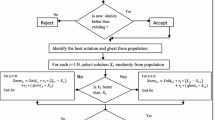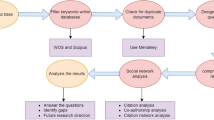Abstract
Group Theory-based Optimization Algorithm (GTOA) is a novel population-based global optimization algorithm, which is used to solve combinatorial optimization problems. This paper studies the applicability of GTOA in numerical optimization and proposes two versions of GTOA based on binary coding (GTOA-b) and \(0\sim 9\) integer coding (GTOA-d). Firstly, the coding transformation methods for representing the feasible solutions are introduced, which make GTOA suitable for continuous optimization. On this basis, the original evolution operators are modified to reduce the deviation and speed up global convergence. The experiment using the CEC2017 test suit is carried out to validate the performance of the algorithms. The influence of parameter values and the differences between the calculated results are analyzed by nonparametric tests. Computation results showed that the convergence rate of GTOA-d is faster than that of GTOA-b, and it achieved better results on the benchmark functions with higher dimensions. The comparison against twelve state-of-the-art and recently introduced meta-heuristic algorithms showed that GTOA-d has the superiority on convergence stability, it obtained significantly better performance than seven of its competitors. Finally, all the algorithms are applied to an Amplitude Variation with Offset inversion case study. The simulation showed that the proposed GTOA-d achieved satisfactory inversion results, and it has better performance in terms of convergence rate and average accuracy. The results demonstrate that the proposed GTOA-d is an effective algorithm for numerical optimization.








Similar content being viewed by others
References
Horst R, Tuy H (2013) Global optimization: deterministic approaches. Springer, Verlag
Dan S (2008) Biogeography-based optimization. IEEE Trans Evol Comput 12(6):702
Pillay N, Engelbrecht AP, Abraham A et al (2016) Advances in nature and biologically inspired computing. Springer International Publishing
Ashlock D (2006) Evolutionary computation for modeling and optimization. Springer, New York. https://doi.org/10.1007/0-387-31909-3
He Y, Wang X (2018) Group theory-based optimization algorithm for solving knapsack problems. Knowl Based Syst. https://doi.org/10.1016/j.knosys.2018.07.045
Goldberg D E (1989) Genetic algorithms in search optimization and machine learning. Addison-Wesley, Boston
Zamani R (2013) A competitive magnet-based genetic algorithm for solving the resource-constrained project scheduling problem. Eur J Oper Res 229(2):552–559
Kennedy J, Eberhart R (1995) Particle swarm optimization. In: Procedings of IEEE int. Conf. Neural networks, Perth, pp 1942–1948
Storn R, Price K (1997) Differential evolution - a simple and efficient heuristic for global optimization over continuous spaces. J Global Optim 11(4):341–359
Qin A K, Huang V L, Suganthan P N (2009) Differential evolution algorithm with strategy adaptation for global numerical optimization. IEEE Trans Evol Comput 13(2):398–417
Das S, Suganthan P N (2011) Differential Evolution: A Survey of the State-of-the-Art. IEEE Trans Evol Comput 15(1):4–31
Dorigo M, Birattari M (2002) Ant colony optimization. Encyclopediaof Machine Learning. Springer, Boston, pp 36–39
Karaboga D, Basturk B (2007) A powerful and efficient algorithm for numerical function optimization: artificial bee colony (ABC) algorithm. J Glob Optim 39(3):459–471
Mirjalili S, Mirjalili S M, Lewis A (2014) Grey wolf optimizer. Adv Eng Softw 69(3):46–61
Al-Betar M A, Awadallah M A, Faris H, et al. (2018) Natural selection methods for Grey Wolf Optimizer. Expert Syst Appl 113:481–498
Larranga P, Lozano J A (2002) Estimation of distribution algorithms: a new tool for evolutionary computation. Springer, New York
Wang J, Tang K, Lozano J A, Yao X (2016) Estimation of the distribution algorithm with a stochastic local search for uncertain capacitated arc routing problems. IEEE Trans Evol Comput 20(1):96–109
Mirjalili S (2016) SCA: A Sine Cosine Algorithm For solving optimization problems. Knowl Based Syst 96:120–133
He Y, Wang X, Gao S (2019) Ring Theory-Based evolutionary algorithm and its application to d0-1KP. Appl Soft Comput 77:714–722
Hossam F, Ala’m A-Z, oubi Asghar AH, et al. (2019) An Intelligent System for Spam Detection and Identification of the most Relevant Features based on Evolutionary Random Weight Networks. Inform Fusion 48:67–83. https://doi.org/10.1016/j.inffus.2018.08.002
Abualigah L M, Khader A T, Hanandeh E S (2018) A new feature selection method to improve the document clustering using particle swarm optimization algorithm. J Comput Sci 25:456–466
Marinakis Y, Marinaki M, Migdalas A (2019) A multi-adaptive particle swarm optimization for the vehicle routing problem with time windows. Inform Sci 481:311–329
Decerle J, Grunder O, Hajjam A, et al. (2019) A hybrid memetic-ant colony optimization algorithm for the home health care problem with time window, synchronization and working time balancing. Swarm Evol Comput 46:171–183
Sallam K M, Chakrabortty R K, Ryan M J (2020) A Two-stage multi-operator differential evolution algorithm for solving Resource Constrained Project Scheduling problems. Future Generation Computer Systems. https://doi.org/10.1016/j.future.2020.02.074
Das K R, Das D, Das J (2015) Optimal tuning of PID controller using GWO algorithm for speed control in DC motor. In: International conference on soft computing techniques implementations. IEEE, Faridabad, pp 108–112
Srikanth K, Panwar L K, Panigrahi B (2018) Meta-heuristic framework: Quantum inspired binary grey wolf optimizer for unit commitment problem. Comput Electr Eng 70:243– 260
Kumar V, Chhabra J K, Kumar D (2016) Grey wolf Algorithm-Based clustering technique. J Intell Syst 26(1):153–168
Mirjalili S, Lewis A (2016) The whale optimization algorithm. Adv Eng Softw 95:51-67. https://doi.org/10.1016/j.advengsoft.2016.01.008
Askarzadeh A (2016) A novel metaheuristic method for solving constrained engineering optimization problems: Crow search algorithm. Compute Struct 169:1–12
Hayyolalam V, Kazem A (2020) Black Widow Optimization Algorithm: A novel meta-heuristic approach for solving engineering optimization problems. Eng Appl Artif Intel 87:103249.1–103249.28
Satnam K, Lalit K. A., Sangal A. L., Gaurav D (2020) Tunicate Swarm Algorithm: A new bio-inspired based metaheuristic paradigm for global optimization. Eng Appl Artif Intel 90:103541. https://doi.org/10.1016/j.engappai.2020.103541
Zhai Q, He Y, Wang G, et al. (2021) A general approach to solving hardware and software partitioning problem based on evolutionary algorithms. Adv Eng Softw. https://doi.org/10.1016/j.advengsoft.2021.102998
Awad N H, Ali M Z, Liang J J, et al. (2017) Problem definitions and evaluation criteria for the CEC 2017 special session and competition on single objective bound constrained Real-Parameter numerical optimization, nanyang technological university, Technical. Report, Singapore
Hashim F A, Hussain K, Houssein E H, et al. (2021) Archimedes optimization algorithm: a new metaheuristic algorithm for solving optimization problems. Appl Intell 51:1531–1551
Sharma B, Prakash R, Tiwari S, et al. (2017) A variant of environmental adaptation method with real parameter encoding and its application in economic load dispatch problem. Appl Intell 47:409–429
Xu G, Zhang T, Lai Q (2021) A new firefly algorithm with mean condition partial attraction. Appl Intell. https://doi.org/10.1007/s10489-021-02642-6
Kruskal W H, Allen W (1952) Use of ranks in one-criterion variance analysis. Publ Am Stat Assoc 47(260):583–621
Garcia S, Fernǎndez A, Luengo J (2009) A study of statistical techniques and performance measures for genetics-based machine learning: accuracy and interpretability. Soft Comput 13(10):959–977
Demiar J, Schuurmans D (2006) Statistical comparisons of classifiers over multiple data sets. J Mach Learn Res 7(1):1–30
Hussain K, Salleh M N M, Cheng S, Shi Y (2018) On the exploration and exploitation in popular swarm-based metaheuristic algorithms. Neural Comput Appl 31(11):7665– 7683
Yan X, Zhu Z, Wu Q, et al. (2019) Elastic parameter inversion problem based on brain storm optimization algorithm. Memet Comput 11(2):143–153
Wang L (2015) Study on intelligent optimization algorithm with application to prestack AVO nonlinear inversion, Dissertation. China University of Geosciences
Yan X, Li P, Tang K, et al. (2020) Clonal selection based intelligent parameter inversion algorithm for prestack seismic data. Inform Sci 517:86–99
Acknowledgements
This article has been supported by the Natural Science Foundation of China (grant nos. 42074155 and 41574131), the PetroChina Innovation Foundation under Grant(2019D-5007-0302), the Natural Science Foundation of Hebei Province (F2020403013), and the Fundamental Research Funds for the Central Universities of China.
Author information
Authors and Affiliations
Corresponding author
Additional information
Publisher’s note
Springer Nature remains neutral with regard to jurisdictional claims in published maps and institutional affiliations.
Rights and permissions
About this article
Cite this article
Li, Z., Zhang, Q. & He, Y. Modified group theory-based optimization algorithms for numerical optimization. Appl Intell 52, 11300–11323 (2022). https://doi.org/10.1007/s10489-021-02982-3
Accepted:
Published:
Issue Date:
DOI: https://doi.org/10.1007/s10489-021-02982-3




